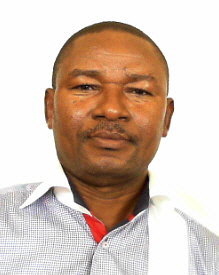Profile
Fullname:
LAWAL AKEEM OLALEKAN
Post:
Professor, HOD Medical Biochemistry
Email Address:
lawalao[at]futa.edu.ng
Telephone:
08107773102
Nationality:
NIGERIA
Affiliation:
The Federal University of Technology Akure, Nigeria
Education:
1. University of California Los Ageles, USA- Post-Doctoral Certificate,
2. University of Strathclyde, UK- Ph.D. Biomedical Sciences
3. University of Ibadan- M.Sc. Biochemistry
4. University of Ibadan- B. Sc. (Hons) Biochemistry
Background:
Dr. Akeem Olalekan Lawal obtained his Bachelor of Science (B.Sc) and Master of Science (M.Sc) degrees in Biochemistry from the University of Ibadan in 1997 and 2003, respectively. He was awarded the best graduating student in the Department of Biochemistry and Faculty of Basic Medical Science, College of Medicine, University of Ibadan in 1997. He was awarded a Commonwealth Scholarship in the United Kingdom for his Doctor of Philosophy (PhD) program at University of Strathclyde, Glasgow, Scotland. Dr Lawal bagged his PhD in Biochemistry (Biomedical Science) in 2010. He won the Gordon Research Conference Bursary Award, USA- 2008. He was a visiting scholar, University of Strathclyde, UK (Jan 2010-April 2010). Dr Lawal was also a postdoctoral fellow at the Environmental Cardiology and Vascular Biology Unit in Department of Medicine, University of California, Los Angeles (UCLA), USA- 2010 t0 2011. He was also the recipient of the prestigious Claude Leon Foundation Postdoctoral Fellowship at the Cape Peninsula University of Technology (CPUT), Bellville South Africa- 2015. He is highly skillful in the use of
different molecular techniques such as tissue and cell culture, real-time PCR, western blot, agarose gel electrophoresis, SDS-PAGE 2D-gel electrophoresis, primer and plasmid designs, reverse transcription, enzyme assay, immunofluorescence, FACS, gene targeting-plasmid/siRNA transfection, cloning, transgenic mice generation, ELISA etc.
In his PhD studies, the molecular mechanisms involve in Cadmium toxicity in human cell lines were investigated. Here, the molecular pathways involve in cadmium toxicity were dissected by investigating the role of oxidative stress (including ROS production, antioxidant defense system such as GSH, GSSG, Catalase, superoxide oxides, heme oxygenase 1, NQO1, GST), intracellular Calcium ions, apoptosis and necrosis, protein kinase delta, phospholipase c, calpain, caspase 3, ATP depletion in cadmium induced toxicity. 2D-gel electrophoresis method was also used to examine the protein profiles in the cells before and after cadmium exposure.
In the past few years, Dr Lawal researches have been focused in the area of air particulate pollutants, using diesel exhaust particles as model air pollutant. The cardiovascular effects of these particles in atherosclerosis, inflammation, plaque formation, oxidation of LDL and HDL, oxidative stress and cholesterol levels in the endothelial cells lining the lumen of blood vessels were examined.
During his Postdoctoral studies at “Environmental Cardiology and Vascular Biology unit, Division of Cardiology, UCLA, He ‘investigated the effect of air particulate matters on the etiology of vascular diseases via the disruption of endothelial cells (EC) integrity’. In this research, the prooxidative and proinflammatory effects of diesel exhaust particles (DEP) on the EC were investigated and how these effects can be attenuated by modulating the expression and activity of heme oxygenase-1 gene (using HO-1 siRNA and HO-1 over expression plasmid) and pharmacologically (using SnPPIX and CoPPIX). Dr Lawal has several collaborators in the UK and in the USA. He was one of the scientists that pioneered the development of tissue specific HO-1 knockout mice and HO-1 transgenic mice at UCLA, USA.
During his postdoctoral study at Cape Peninsula University of Technology, South Africa, Dr Lawal investigated the anti-oxidative, anti-inflammatory and anti-fibrogenic effects of Rooibos tea against the Diesel Exhaust Particles (DEP) -induced effects in human immortalized keratinocyte, human vein endothelial cells and human fibroblast.Currently, Dr Lawal is investigating the effects of air particulate matter exposure in pathological conditions such as diabetes.
Dr A. O. Lawal joined the services of the University on the 3rd of March, 2016 as a Senior Lecturer. He was promoted to the position of a Reader in 1st of October, 2019. Dr A.O. Lawal has served the Department and University in different capacities: Secretary, Excellence Award Committee, Department of Biochemistry (2016), Coordinator, Quality Assurance Committee, Department of Biochemistry (2016-2020), Coordinator, Accreditation Committee, Department of Biochemistry (2017), Chairman, Local Organizing Committee, On Workshop in Basic Training on Molecular Biology Techniques to mark the 40th anniversary of FUTA (15th-17th November, 2021), PGD Coordinator, Department of Biochemistry (2020-2022) and Acting HOD, Medical Biochemistry, School of Basic Medical Science (2021-till date).
He has taught undergraduate and postgraduate courses in the department including: Element of Genetic Engineering & Biotechnology, Introduction to Cell and Molecular Biology (BCH 309), Molecular Biology of Gene (BCH 407), Membrane Biochemistry (BCH 314), Biomembrane & Bioenergetics, Pharmacology Biochemistry, Bioenergetic principle, Biotechnology, Introduction to Nucleic acid, Recombinant DNA Technology, Gene Regulation, Biochemical methods, He is physically and emotionally stable, and relates well with the colleagues. Dr Lawal as co-supervised the graduation of 2 PhD and supervised the graduation of 7 M.Tech students while 3 PhD and 5 M. Tech students are currently under his supervision. Dr Lawal research areas are in Biotechnology, Molecular and Cellular Biochemistry and Toxicology, and Phytomedicine with specific interest on the use of genetic manipulation as therapeutic approach in tackling health effect of environmental pollutants and the anti-inflammatory and antioxidant activities of tropical plants with the attendant health implications and biotechnological applications.


